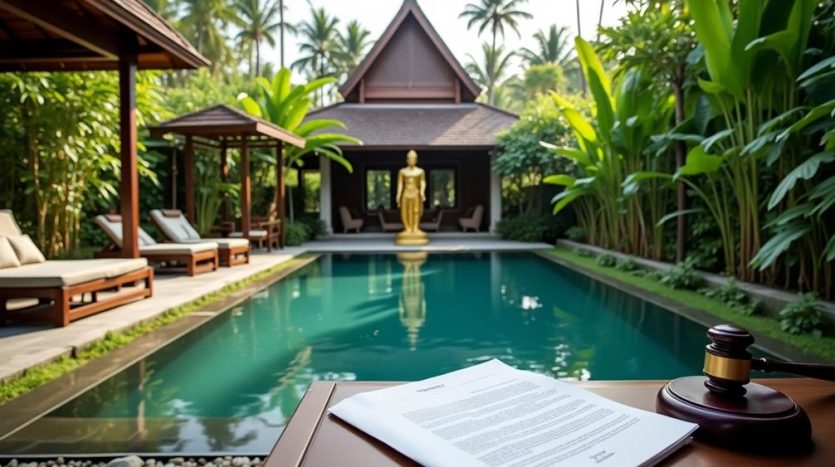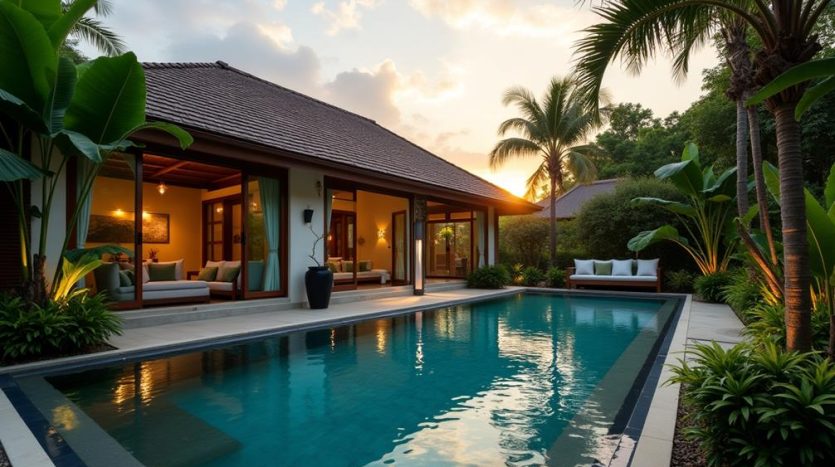Can a Foreigner Buy a Pool Villa in Thailand?
If you're considering an extended holiday in Thailand, you might be curious about owning a luxurious pool villa. While owning land outright isn't on the table for foreigners, there are ways to obtain that dream property. By maneuvering leasehold agreements or setting up a Thai company, you can legally own the villa's structure. But what are the key legalities and potential pitfalls you need to be aware of to make a sound investment? Let's explore the ins and outs of acquiring a pool villa in Thailand and guarantee you're making an informed decision.
Key Takeaways
- Foreigners can own the structure of a pool villa but not the land it sits on.
- Leasehold agreements are a common method for foreigners to control property for up to 30 years.
- Foreigners can set up a Thai company, with at least 51% Thai ownership, to indirectly own the property.
- Pool villas are not covered under the Condominium Act, limiting direct land ownership options for foreigners.
- Legal due diligence and compliance with Thai property laws are essential to avoid complications.
Thai Property Laws
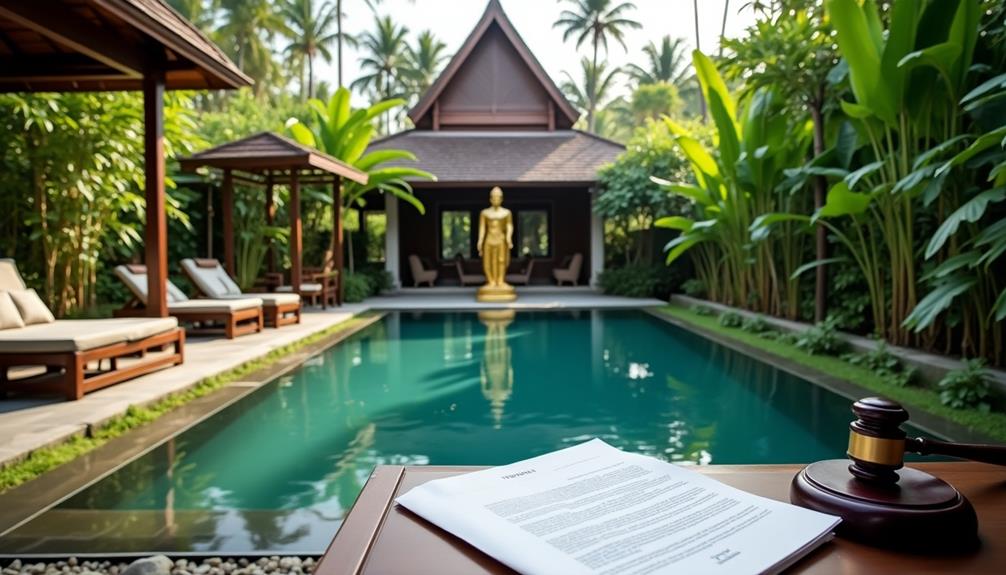
When you're considering buying a pool villa in Thailand, understanding Thai property laws is essential. No one wants to navigate the labyrinth of legal jargon without a guide, right? So let's explore the nitty-gritty.
Thailand's property market is enticing for foreign investment, but it comes with its quirks. First off, while foreigners can't own land outright, you can still own the structure on it. Think of it as buying a fancy treehouse without owning the tree.
To get around this, you can lease the land. Typically, leases are 30 years with an option to renew, which isn't too shabby. Another avenue is setting up a Thai Limited Company, where foreigners can hold up to 49% of the shares. This lets you get a slice of the pie without needing to learn the Thai national anthem.
However, keep in mind that nominee shareholders are illegal and could lead to serious legal issues.
Now, don't forget about the ever-so-exciting due diligence. Check land titles, zoning laws, and confirm there aren't any unresolved disputes. It's like solving a mystery but with higher stakes.
Foreign Ownership Limits
Understanding Thai property laws is just the beginning of your journey. When it comes to foreign ownership limits, you've got some hoops to jump through. In Thailand, foreigners can't directly own land, which might put a damper on your dreams of sipping cocktails by your own pool villa. But don't worry—there's a workaround or two.
First, let's tackle foreign investor motivations. You might be drawn by the idyllic lifestyle, the tropical climate, or the potential for rental income. But here's the kicker: foreign ownership is limited to 49% of the total area of a condominium project.
As for pool villas, you can own the house, but not the land it sits on. It's like owning a car but not the parking spot. Additionally, verifying title deeds is essential to guarantee legitimacy and avoid disputes.
Now, let's not forget cultural considerations. Thai laws are deeply rooted in preserving national interests. They want to make certain their land remains, well, their land.
Leasehold vs. Freehold
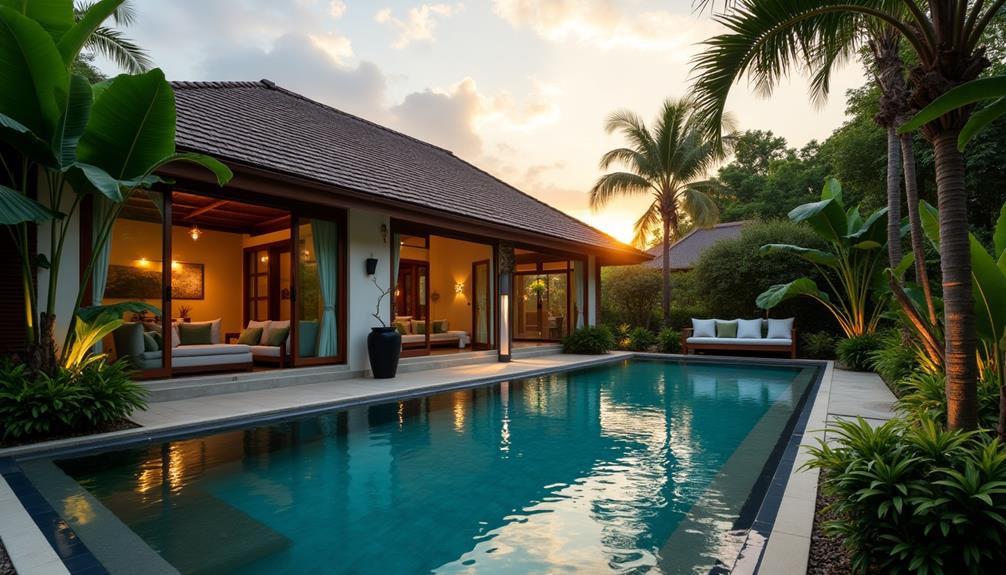
Steering the choice between leasehold and freehold options is crucial for any prospective pool villa owner in Thailand.
You've got two paths: one with strings attached and the other with a bit more freedom. Leasehold agreements typically span up to 30 years with an option to renew. The upside? You can legally hold the property in your name, no Thai partner needed.
However, remember, you're fundamentally a long-term tenant—like renting a fancy hotel room for decades.
On the flip side, freehold advantages are tempting but tricky. As a foreigner, you can't directly own land, but you can own the building. This requires setting up a Thai company or marrying a local (not suggesting a shotgun wedding here).
Freehold gives you absolute ownership of the villa and the land it sits on, making it a more secure long-term investment.
Condominium Act
Maneuvering the intricacies of Thailand's Condominium Act can considerably impact your decision to buy a pool villa. The Condominium Act allows foreigners to own up to 49% of the total area of all units in a condominium building. This means you can engage in foreign investment with some level of security, but there's a catch if you're dreaming of a stand-alone pool villa.
Under this act, your property rights are solid in a condo, but a pool villa falls outside its purview. You can't directly own land, and villas, unlike condos, usually come with a chunk of earth beneath them. It's like wanting the cake and the icing but only getting the sprinkles.
Foreigners interested in living in Thailand should also consider affordable living costs, which can make indirect ownership more viable.
However, don't lose hope just yet! You could still own a pool villa indirectly through leasehold agreements or other legal structures. While the Condominium Act doesn't cover such arrangements, understanding its nuances can help you navigate Thailand's property laws more effectively.
Think of it as learning the rules of Monopoly before playing; you'll know when to buy, when to hold, and when to strategize for that dream pool villa without going bankrupt.
Using Thai Companies

When considering buying a pool villa in Thailand, you should understand the legal ownership structures available through using Thai companies.
Registering a company can provide a legitimate path for foreign ownership, but it requires maneuvering through specific local regulations.
You'll need to guarantee the company is properly set up and compliant with Thai laws to avoid any legal complications.
Legal Ownership Structures
Maneuvering the legal ownership structures for buying a pool villa in Thailand often involves using Thai companies. You might be drawn by investment motivations or the allure of Thai culture.
Either way, understanding how to legally own property is essential. Foreigners can't directly own land, but they can own a Thai company that does. This is your golden ticket, but it comes with a few obstacles.
You'll need Thai shareholders to own at least 51% of the company, making you the minority shareholder. Don't roll your eyes just yet; it's a common practice. The key is finding trustworthy partners—think of it as a matchmaking service but for business.
You must handle cultural considerations with finesse, as Thais value relationships and trust.
Creating a company sounds intimidating, but it allows you to control the villa indirectly. You can still enjoy the poolside cocktails while your company holds the deed. It's like having your cake and eating it too, but with a side of spicy Thai curry.
Company Registration Process
Setting up a Thai company to purchase a pool villa is a strategic move that opens doors to property ownership despite legal restrictions on foreign land ownership.
You'll start by choosing between two main company types: a Thai Limited Company or a Board of Investment (BOI) promoted company. The former is more common for property purchases, while the latter offers certain perks like tax incentives but comes with stricter registration requirements.
First, you'll need to find at least three shareholders, with a majority being Thai nationals holding 51% of the shares. This guarantees compliance with the Foreign Business Act.
Then, get ready to jump through hoops by preparing essential documents like a Memorandum of Association, Articles of Association, and a list of shareholders. Don't forget, you'll also need a registered office address in Thailand.
Next, submit your documents to the Department of Business Development (DBD) and pay the registration fee. Boom! You've got a company.
But wait—your adventure isn't over yet. You'll need to open a corporate bank account and obtain a tax ID number.
Voila! You're now the proud owner of a Thai company, ready to engage in pool villa ownership.
Legal Due Diligence
When buying a pool villa in Thailand, you must navigate the country's land ownership restrictions and guarantee all necessary documentation is in order.
Foreigners can't own land directly, so you'll need to explore legal structures like leaseholds or Thai company ownership.
In popular areas like Chaweng or Lamai, where many expats reside, it's essential to understand the local property market and any community-specific regulations.
Careful scrutiny of title deeds, land office records, and contractual agreements is vital to protect your investment and comply with Thai law.
Land Ownership Restrictions
Purchasing a pool villa in Thailand can be an enticing prospect, but it's crucial to understand the land ownership restrictions that apply to foreigners.
Unfortunately, under Thai law, you can't outright own land as a foreigner. Don't panic, though—there are legal ways to navigate this. One popular method is through a land lease. You can sign a lease agreement for up to 30 years with the possibility of renewal, giving you plenty of time to enjoy your poolside mojitos.
Another workaround involves setting up a Thai company to hold the property rights. This means you'll need to partner up with Thai nationals who collectively own at least 51% of the company. Think of it as starting a business, but your main product is your dream villa.
Don't forget about the condominium loophole, either. While you can't own land, you can own an apartment in a building where at least 51% of the units are Thai-owned. This doesn't directly apply to pool villas but can offer some flexibility if you're open to different types of properties.
Necessary Documentation Steps
Maneuvering the legal landscape of land ownership restrictions is just one part of the process. Now, let's talk about the necessary documentation steps—because who doesn't love paperwork? You'll need to tackle legal due diligence to guarantee everything's above board. Here's a cheat sheet to keep things simple:
| Step | Description | Why It Matters |
|---|---|---|
| Title Search | Verify the land title with the Land Department | Confirms legal ownership |
| Sales Agreement | Draft and review the contract with legal counsel | Protects your interests |
| Due Diligence | Check for liens, encumbrances, and zoning regulations | Avoids nasty surprises |
| Transfer Fees | Pay taxes and fees at the Land Office | Completes the ownership transfer legally |
Mortgage requirements are quite stringent for foreigners, so you might need to cough up a hefty down payment. But hey, the investment benefits are worth it! Imagine lounging by your pool in sunny Thailand.
Financing Options

Exploring financing options for your dream pool villa in Thailand can seem intimidating, but breaking it down makes it manageable.
First off, let's talk mortgage options. While Thai banks are typically hesitant to offer mortgages to foreigners, don't fret just yet. Some international banks with branches in Thailand might come to your rescue. It's like finding a rare Pokémon, but they do exist!
Now, if traditional mortgages aren't your thing, reflect on alternative financing. Developer financing is one option, where the property developer offers you a payment plan. This might come with higher interest rates but hey, at least you're not selling your soul to the bank, right?
Here's what you need to contemplate:
- Interest Rates: They can be higher for foreigners, but shop around. Comparing options is like swiping on a dating app—eventually, you'll find the right match.
- Loan Tenure: Shorter tenures can mean heftier monthly payments. Can you juggle those with your daily expenses?
- Down Payment: This is usually around 30% of the property price. Start saving now, or kiss that villa goodbye!
Navigating these options with some humor and patience will get you closer to lounging by your pool in no time!
Tax Implications
When buying a pool villa in Thailand, you'll need to account for various tax implications, including property transfer fees and withholding tax rates.
Property transfer fees are typically 2% of the appraised value, while withholding tax rates depend on whether the seller is an individual or a company.
Understanding these costs upfront helps you budget accurately and avoid surprises during the transaction process.
Property Transfer Fees
Steering through the intricacies of property transfer fees is essential when buying a pool villa in Thailand. You can't just throw money at a villa and shout, "Mine now!"
There are several fees that sneak up on you like a gecko on a warm night. First, the property valuation is vital. This isn't just the sticker price; it's what the Land Department thinks your dream villa is worth. Spoiler alert: they don't always align.
Next, consider the transfer timeline. The Land Department moves at its own pace, so don't expect things to happen overnight. Patience, grasshopper!
Here's what'll make you want to grab a stress ball:
- Transfer Fee: Typically 2% of the property valuation. Ouch!
- Stamp Duty: If applicable, it's 0.5% of the property valuation.
- Specific Business Tax: If the property is sold within five years, this is 3.3% of either the selling price or the property valuation, whichever is higher.
Navigating these fees is like mastering a complex dance—one wrong step, and you could be out more money than you bargained for.
Withholding Tax Rates
Tackling the subject of withholding tax rates is vital when buying a pool villa in Thailand. As a foreign investor, you must understand how these taxes will impact your purchase and future profits.
When you sell your property, the government imposes a withholding tax, which is fundamentally a prepayment of income tax.
So, what's the damage? For individuals, the withholding tax is calculated based on the registered sale price or the appraised value, whichever is higher. The rate is progressive, ranging from 0.5% to 5%. Yes, you read that right—it's like a financial roller coaster!
For companies, the tax rate sits at a flat 1% of the sale price. While this might seem simpler, it's still important to factor it into your investment strategy.
Keep in mind, the withholding tax is deducted at the time of the sale, so don't be caught off guard.
Now, here's a fun fact: Thailand's tax system is complex, but not insurmountable. With a little planning and some professional advice, you can navigate these waters smoothly.
Working With Agents
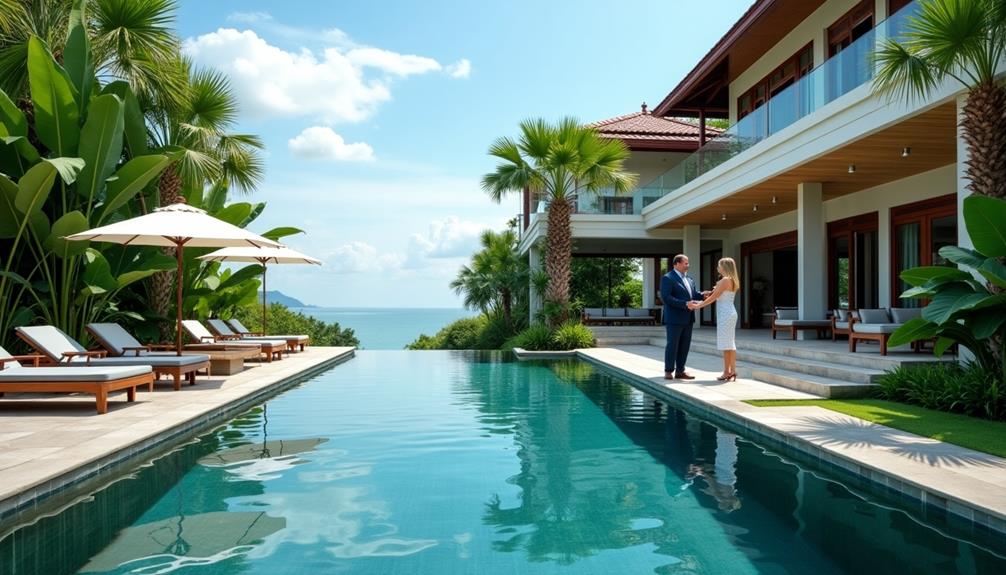
Steering the process of buying a pool villa in Thailand can be markedly streamlined by working with experienced agents. Think of them as your personal tour guides in the labyrinth of Thai real estate.
First off, agent selection is essential. Not all agents are created equal—some might be more interested in their commission than your dream villa. A good agent will have extensive local knowledge, a network of reliable contacts, and a track record of successful deals.
When it comes to negotiation strategies, a seasoned agent's expertise can be a game-changer. They know the market, the common pitfalls, and how to get you the best bang for your buck. Imagine walking away from a negotiation feeling like a rock star because your agent snagged you that ocean view at a steal.
Here are three reasons why working with an agent is a no-brainer:
- Local Expertise: They know the ins and outs of the local market.
- Negotiation Skills: They can save you money with savvy negotiation strategies.
- Stress Reduction: They handle the nitty-gritty details, so you don't have to.
Trust me, working with an agent will make the journey not only easier but also way more enjoyable.
Common Pitfalls
While working with an experienced agent can tremendously ease your journey, being aware of common pitfalls will arm you with the knowledge to avoid potential headaches.
First, cultural differences can trip you up. Thai etiquette in business dealings is unique—don't be surprised if negotiations involve more pleasantries and less confrontation than you're used to. Smile often, and remember, patience is a virtue.
Now, about those negotiation tactics: haggling isn't just a skill, it's an art form here. But tread lightly; pushing too hard can offend. Instead, aim for a "win-win" scenario. It's like dancing—sometimes you lead, sometimes you follow.
One major pitfall is failing to understand Thai property laws. Foreigners can't own land directly, so you'll need to look into leasehold agreements or setting up a Thai company. Missing these nuances can leave you in a legal quagmire.
Also, don't overlook property inspections. That sparkling pool villa might hide structural issues or zoning problems. Always hire a professional to inspect before signing anything.

